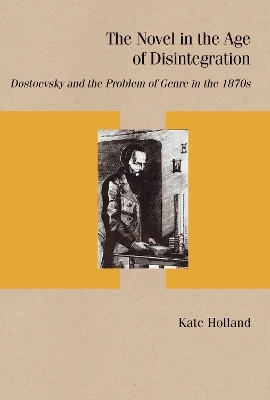
The Novel in the Age of Disintegration
Dostoevsky and the Problem of Genre in the 1870s
Seiten
2021
Northwestern University Press (Verlag)
978-0-8101-4449-1 (ISBN)
Northwestern University Press (Verlag)
978-0-8101-4449-1 (ISBN)
Scholars have long been fascinated by the creative struggles with genre manifested throughout Dostoevsky's career. In The Novel in the Age of Disintegration, Kate Holland shows that Dostoevsky aimed to use the form of the novel as a means of depicting the disintegration caused by various crises in Russian society in the 1860s.
Scholars have long been fascinated by the creative struggles with genre manifested throughout Dostoevsky’s career. In The Novel in the Age of Disintegration, Kate Holland shows that Dostoevsky aimed to use the form of the novel as a means of depicting the disintegration caused by various crises in Russian society in the 1860s. This required him to reinvent the genre. At the same time, he sought to infuse his novels with the capacity to inspire belief in social and spiritual reintegration, and to this end he returned to old forms and structures that were already becoming outmoded.
In thoughtful readings of Demons, The Adolescent, A Writer’s Diary, and The Brothers Karamazov, Holland delineates Dostoevsky’s struggle to adapt a genre to the reality of the present, with all its upheavals, while maintaining a utopian vision of Russia’s future mission.
Scholars have long been fascinated by the creative struggles with genre manifested throughout Dostoevsky’s career. In The Novel in the Age of Disintegration, Kate Holland shows that Dostoevsky aimed to use the form of the novel as a means of depicting the disintegration caused by various crises in Russian society in the 1860s. This required him to reinvent the genre. At the same time, he sought to infuse his novels with the capacity to inspire belief in social and spiritual reintegration, and to this end he returned to old forms and structures that were already becoming outmoded.
In thoughtful readings of Demons, The Adolescent, A Writer’s Diary, and The Brothers Karamazov, Holland delineates Dostoevsky’s struggle to adapt a genre to the reality of the present, with all its upheavals, while maintaining a utopian vision of Russia’s future mission.
KATE HOLLAND is an associate professor in the Department of Slavic Languages and Literatures at the University of Toronto and President of the North American Dostoevsky Society.
| Erscheinungsdatum | 15.11.2021 |
|---|---|
| Reihe/Serie | Studies in Russian Literature and Theory |
| Verlagsort | Evanston |
| Sprache | englisch |
| Maße | 152 x 229 mm |
| Gewicht | 353 g |
| Themenwelt | Geisteswissenschaften ► Sprach- / Literaturwissenschaft ► Anglistik / Amerikanistik |
| Geisteswissenschaften ► Sprach- / Literaturwissenschaft ► Literaturgeschichte | |
| Geisteswissenschaften ► Sprach- / Literaturwissenschaft ► Literaturwissenschaft | |
| ISBN-10 | 0-8101-4449-2 / 0810144492 |
| ISBN-13 | 978-0-8101-4449-1 / 9780810144491 |
| Zustand | Neuware |
| Haben Sie eine Frage zum Produkt? |
Mehr entdecken
aus dem Bereich
aus dem Bereich
Poetik eines sozialen Urteils
Buch | Hardcover (2023)
De Gruyter (Verlag)
59,95 €
Buch | Softcover (2024)
belleville (Verlag)
20,00 €


